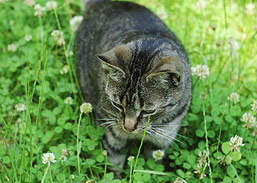The ASPCA reports that the average lifespan for an indoor domestic cat is now 13 to 17 years, but many cats are living well into their 20s. Advances in veterinary medicine, nutrition and education are helping pet parents enjoy their feline companions for longer than ever before. Longer lifespans do not necessarily mean that cats are aging more slowly; they are staying old longer. Caring for geriatric cats presents a new set of challenges. Cognitive health is an area that affects nearly half of cats over the age of 15, but it is often overlooked as part of the normal aging process.
Cognitive Dysfunction Syndrome (CDS) is a degenerative disease that affects most animals including humans, which we call dementia, senility or Alzheimer’s disease. CDS is recognized by changes in a cat’s behavior. Cats who normally recognize what time their humans come home or when dinner is served, have difficulty keeping track of their usual routine. Their sleep cycles may be off and confused cats often will loudly meow and yowl during the night. As the disease progresses you may notice changes in your cats’ personality and affection level. Some cats stare into space, wander aimlessly or get lost in familiar surroundings. The biggest problems occur when cats lose track of their litter box and urinate or defecate in inappropriate places. Sadly failure to use the litterbox is one of the leading reasons cat owners chose to have their geriatric cats euthanized.
The physical changes in the brain that cause cognitive decline are not well understood, but researchers believe changes in mental function are related to an increase in free radicals or a decrease in vascularization. Veterinarians know a lot more about how cognitive dysfunction syndrome affects dogs and how to treat it than they do about cats, but much of the research is transferrable.
Be cautious if you do notice these behavioral changes in your pet because often times similar symptoms can be caused by other conditions such as arthritis, urinary tract infections, diabetes or even cancer. It is always important to see your veterinarian if you have any concerns about your cats’ health because your vet can examine your cat and run bloodwork to confirm that there is not an underlying problem.
Some drug therapies are available for Cognitive Dysfunction Syndrome, but prevention is always the best plan. Providing your cat with a healthy diet that is rich in antioxidants and omega 3 fatty acids will help keep your pet healthy. Enrichment activities and lots of playtime will also help keep your cats’ minds sharp. Cats suffering from dementia will often feel anxious from their confusion so calming supplements or pheromones may be beneficial to help them relax. Most importantly, our senior pets need our love and compassion because they have given us a lifetime of joy.
Studies
Cognitive dysfunction and the neurobiology of aging in cats.
Cognitive dysfunction in cats: a syndrome we used to dismiss as ‘old age’.
Dysfunctions associated with dementia and their treatment.
DHA improves cognition and prevents dysfunction of entorhinal cortex neurons in 3xTg-AD mice.
Docosahexaenoic acid and the aging brain.


